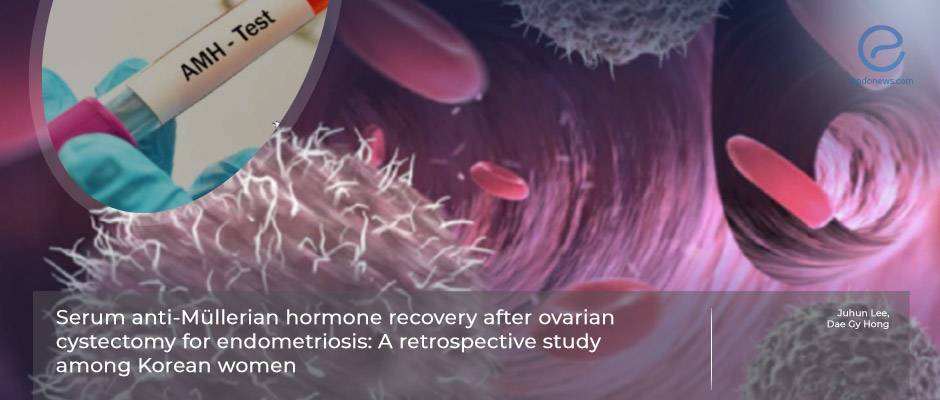Postoperative serum markers to predict serum AMH recovery following endometriosis surgery
Nov 16, 2022
The recovery in serum AMH could be predicted by postoperative serum CRP levels in women with endometriosis.
Key Points
Highlights:
- Ovarian cystectomy for endometriosis causes diminished serum anti-Mullerian hormone (AMH) levels in women with endometriosis.
Importance:
- Serum CRP level following surgery could be used as a predictor for recovery in serum AMH levels after surgery.
What’s done here?
- This prospective cohort study assessed the association between inflammatory factors and serum AMH recovery from low levels after endometriosis surgery.
- All participants received unilateral or bilateral ovarian cystectomies and medical treatment was prescribed to prevent the recurrence.
- Serum AMH levels were measured before the surgery and at least twice within postoperative two years.
- Inflammatory factors [white blood cell (WBC) count, neutrophil count, sedimentation rate (ESR), C-reactive protein (CRP), and CA-125] on the surgery day.
- Additionally, ESR and CA-125 levels were measured 3 to 6 months following surgery.
- The study population was divided into two groups based on serum AMH levels: those with AMH recovered (nadir group, n=106) and the reduction group (n=53).
Key results:
- Most patients had stage 3-4 endometriosis (rASRM) in both groups and the mean size of endometriomas was similar between the groups.
- There was no significant correlation between postoperative serum AMH recovery and the stage, bilaterality, surgical methods (robotic/laparoscopic), or surgical time.
- Serum CA-125 level was significantly higher and decreased significantly after the surgery in the recovery group compared to the reduction group.
- The postoperative CRP was significantly higher and increased significantly after the surgery in the recovery group and was related to the serum AMH levels from the nadir.
Limitations:
- Retrospective design, the presence of inter-cycle variability of serum AMH levels, and not excluding women over 40 years are the limitations of the study.
- Some postoperative inflammatory factors such as CA-125 or ESR were not measured on the planned date.
Lay Summary
Women with endometriosis seek treatment including ovarian cystectomy, because of symptoms that reduce their quality of life. Ovarian cystectomy using laparoscopic or robotic devices is the preferred therapy. However, it has been shown in the literature that ovarian reserve is adversely affected after this surgical approach.
Lee et al., from Korea, published a review titled “Serum anti-Müllerian hormone recovery after ovarian cystectomy for endometriosis A retrospective study among Korean women” in the journal named Medicine. The authors aimed to evaluate the correlation between inflammatory factors and serum AMH recovery after endometriosis surgery in Korean women. They compared all demographic and clinical characteristics between the "AMH recovery" and "AMH reduction" groups.
There was no significant correlation between postoperative recovery of serum AMH level after the surgery regardless the stage / bilaterality of the lesion, surgical methods, such as robot-assisted or laparoscopic surgery, or surgical time. Serum CA-125 level was significantly higher, and it decreased significantly after the surgery in the recovery group compared to the reduction group. Similarly, the postoperative CRP level was significantly higher and increased significantly after the surgery in the recovery group.
The authors suggested that inflammatory factors including serum CRP levels were associated with postoperative serum AMH levels as the only significant variable related to the recovery of serum AMH levels was increased serum CRP.
“Postoperative serum CRP level could be used as a marker to predict the sAMH recovery after surgery,” the authors concluded.
Research Source: https://pubmed.ncbi.nlm.nih.gov/36221377/
anti-Mullerian hormone inflammation ovarian cystectomy ovarian endometriosis ovarian reserve surgery cA125 endometrioma

